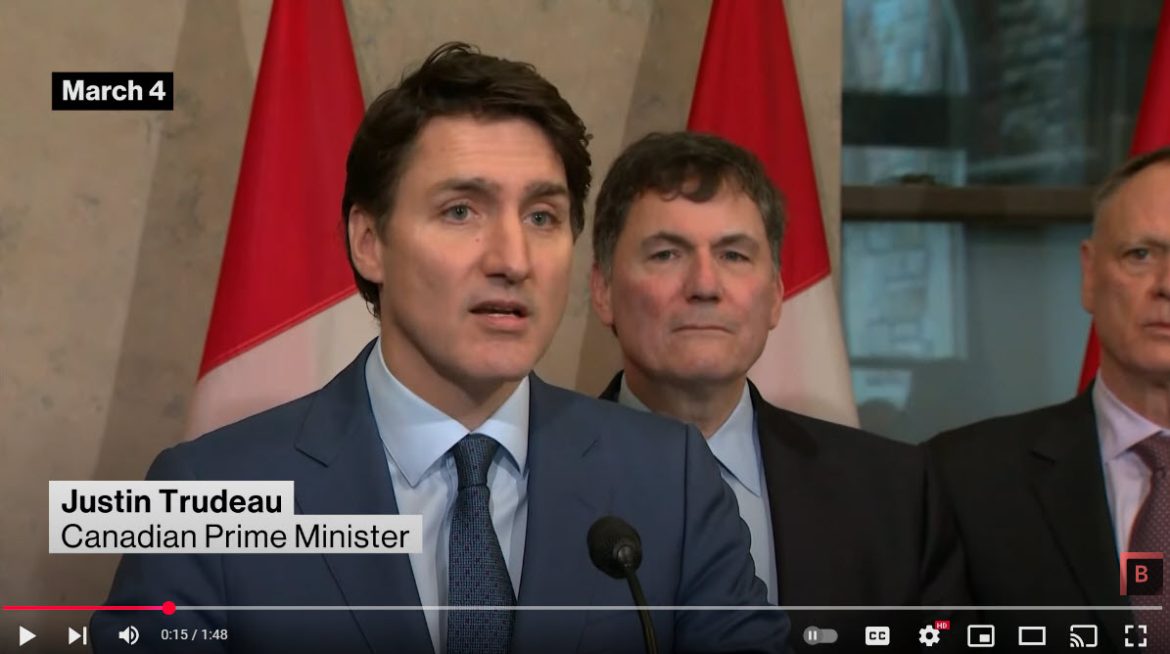The ongoing trade war between the United States and Canada intensifies as President Donald Trump’s tariffs on Canadian imports officially take effect. In response, Canadian Prime Minister Justin Trudeau announces immediate retaliatory measures, imposing a 25% tariff on $30 billion worth of U.S. imports. The economic standoff between the two leaders escalates further as Trump takes to social media to warn Canada that any countermeasures will be met with an equivalent tariff increase.
Trump, who often refers to Trudeau as the “Governor of Canada” and has mockingly called the country “America’s 51st state,” posts on Truth Social, stating, “Please explain to Governor Trudeau that when he puts on a retaliatory tariff on the U.S., our reciprocal tariff will immediately increase by a like amount!” The remark fuels tensions between the two governments, with Canadian officials condemning the U.S. approach as reckless and harmful to both economies.
The tariffs, which also apply to Mexico and China, are part of Trump’s broader economic policy aimed at pressuring foreign governments to renegotiate trade terms with the U.S. The White House justifies the move by arguing that Canada and Mexico must take stronger action to curb the flow of fentanyl into the U.S., a claim that Trudeau rejects as an unfair condition for trade negotiations.
In a press conference, Trudeau refuses to back down, stating, “We will not be pushed around. We will defend Canadian workers and industries.” He acknowledges that the tariffs will have a significant economic impact but insists that Canada has no choice but to respond firmly. He warns that the trade war could cause short-term economic pain for both nations, particularly in sectors such as agriculture, manufacturing, and energy.
Economists caution that the tit-for-tat tariffs could drive up costs for consumers on both sides of the border. American industries reliant on Canadian steel and aluminum, including the auto sector, are expected to feel the effects almost immediately. Similarly, Canadian businesses that depend on U.S. exports, including agricultural products and industrial equipment, are bracing for financial strain.
The diplomatic standoff between Trump and Trudeau reflects broader tensions within U.S.-Canada relations. While trade disputes have flared up in the past, the current level of hostility is unprecedented. Business leaders and lawmakers on both sides are urging for a resolution before the trade war causes lasting damage. Despite the heated rhetoric, officials from both governments continue behind-the-scenes negotiations to explore potential compromises.
As the tariffs take effect and countermeasures escalate, the economic and political ramifications of the dispute remain uncertain. The coming weeks will determine whether the U.S. and Canada can find common ground or if the trade war will further strain the long-standing partnership between the two countries.
Source Links:
- YouTube: “We Will Not Back Down From a Fight” – Justin Trudeau on Trump Tariffs
- YouTube: Trump Puts “Governor Trudeau” on Notice for Criticizing Tariffs
- YouTube: Trudeau Responds to U.S. Tariffs: “I Won’t Sugarcoat It, This Is Going to Be Tough”



